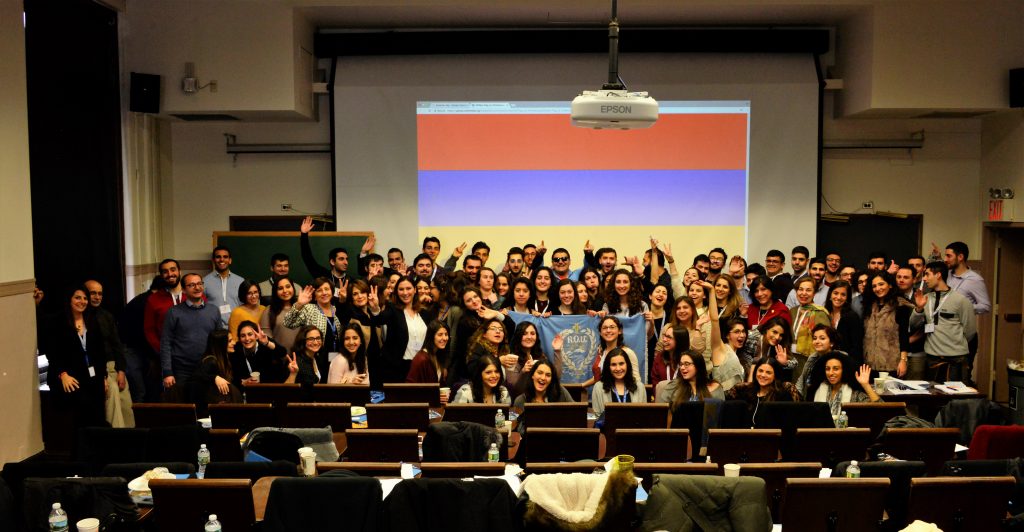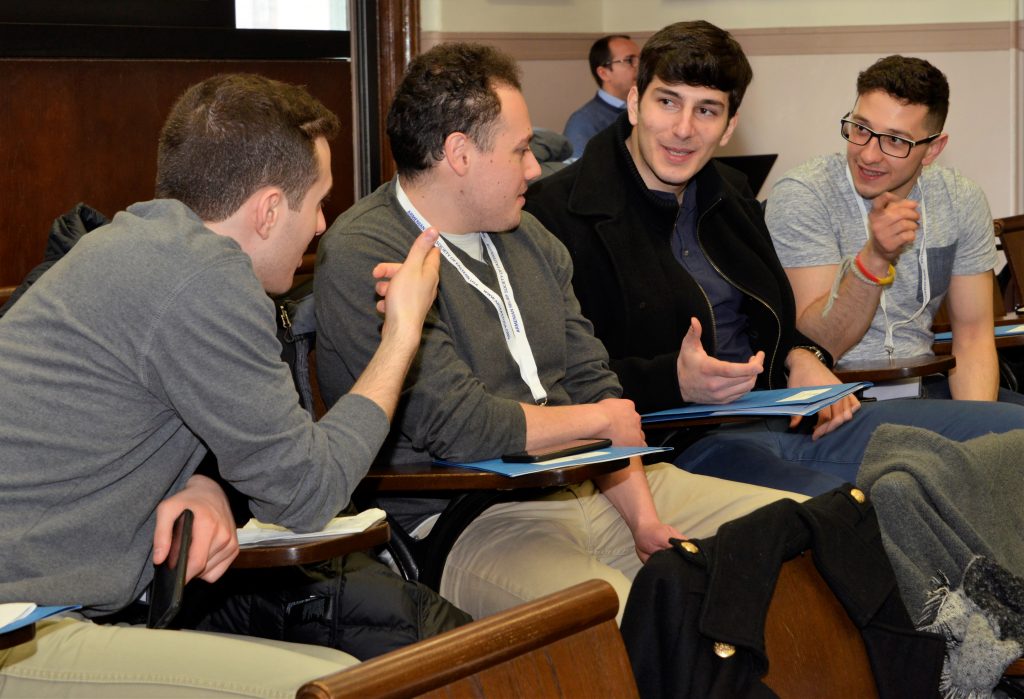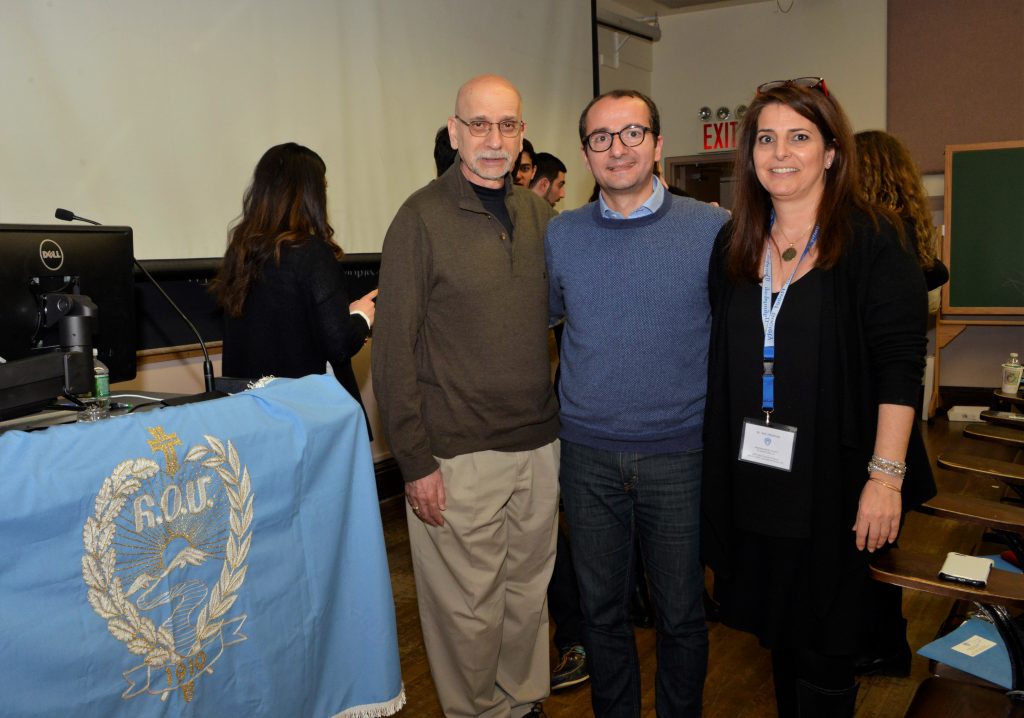ARS of Eastern USA Youth Connect Program Takes Place on March 4
NEW YORK (A.W.)—On March 4, nearly 100 college-aged Armenian youth from across the U.S. and Canada braced subzero temperatures together at Columbia University for a full day of discussion, resource-sharing, and networking. The biannual Armenian Relief Society (ARS) Youth Connect Program (YCP) has quickly become one of the premier forums for Armenian youth to learn about non-conventional approaches to Armenian identity, politics, and culture.

On March 4, nearly 100 college-aged Armenian youth from across the U.S. and Canada braced subzero temperatures together at Columbia University for a full day of discussion, resource-sharing, and networking.
The program, sponsored and organized by the ARS Eastern U.S. Region and the Columbia University Armenian Society, was once again directed by the Nikit and Eleanora Ordjanian Visiting Professor at Columbia University, Dr. Khatchig Mouradian.
Each installment of the program embodies a particular theme. This session contained an emphasis on the importance of an individual’s contribution to a cause. Lectures and discussions centered on the topics of public health, culture, identity, and human rights. The speakers were Dr. Kim Hekimian, Assistant Professor of Nutrition at Columbia University; Dr. Levon Avdoyan, Library of Congress Area Specialist for Armenia and Georgia; Sarah Leah Whitson, Executive Director of Human Rights Watch Middle East and North Africa (MENA) Division; and Dr. Mouradian.

The speakers were Dr. Kim Hekimian, Assistant Professor of Nutrition at Columbia University; Dr. Levon Avdoyan, Library of Congress Area Specialist for Armenia and Georgia; Sarah Leah Whitson, Executive Director of Human Rights Watch Middle East and North Africa (MENA) Division; and Dr. Mouradian.
The first speaker, Dr. Hekimian, stressed the critical role of education and awareness in eradicating many of the public health epidemics in Armenia, ranging from diabetes to nutrient deficiencies in the averagediet to the exorbitant rate of tobacco consumption. Her studies on infant feeding practices in Armenia are groundbreaking, revealing staggering results. About 20% of Armenian children under five are stunted; another 15% are overweight. “When nearly 40% of the youth population in an already small country is starting out unhealthy in life, this poses an existential crisis to the future of the Armenian Republic,” argued the professor.
However, despite the difficulties, many lessons can be learned from this, she continued. Changing this trajectory involves the youth, particularly in the diaspora, to engage. As the Associate Director of the Masterin Public Health program at the American University of Armenia, Hekimian oversaw dozens of graduates who took on major public health projects throughout the country. The diaspora needs to become a more vocal proponent of this type of change because healthier Armenia is a safer Armenia.
A major successful diasporan creation has been the preservation of priceless Armenian artifacts in the Library of Congress (LOC), the world’s largest library. An over three-decade veteran of the LOC, Dr. Avdoyan has helped grow the library’s Armenian collection to a whopping 45,000 items (and counting), and in 2012, curated a five-month exhibition to commemorate the 500th anniversary of the first printed Armenian book.
Avdoyan presented images of some of the most fascinating artifacts from the Armenian collection, including a photograph of Lady Azgapetyan, the first woman to represent Armenia at the World Suffragettes’ Conference held in Paris in 1919, and a chilling letter written by Talaat Pasha to the American ambassador to the Ottoman Empire, Henry Morgenthau, thanking him for hosting a dinner that evening. The letter was dated April 24, 1915.
“When I noticed the date on the letter, I cannot describe the chilling sensation I felt,” said an incredulous Avdoyan. These precious testaments of Armenian history are located in our nation’s capital, and Avdoyan encouraged all to visit, explore, and take advantage of this amazing resource. He also stressed the need to revitalize interest in ancient studies, particularly for the accurate understanding of history in the modern world. To this effect, Avdoyan is currently working on a book with Dr. Nina Garsoïan, one of the pioneering academics of Armenian studies and foremost scholars of ancient Armenian history.
The next presentation focused on Dr. Mouradian’s travels to Western Armenia and the “Hidden Armenians” he has met and grown close to throughout his many travels to the region. Particularly poignant was the story of Armen, a Kurdish-born Muslim who, after over 50 years, discovered his Armenian identity and has been working towards a full-fledged transformation. Armen’s father was an Armenian Genocide survivor who, to prove his loyalty to the Turkish state, named his first-born son Talaat. Armen’s sheer love for his newfound identity, despite the perilous burden it poses, illustrates exactly what it means to be an Armenian, which is not contained in any parameter. “If you choose to be an Armenian, then you are Armenian,” Mouradian explained. Armen made the choice to be an Armenian under the most difficult of circumstances. Mouradian passionately posed the question, “Who in this room can argue that Armen is not Armenian?”
Mouradian also highlighted the importance of intersectionality and working with and across different groups and causes to elevate our own. “What was progressive 100 years ago is not progressive today. People in the mountains of Sasun didn’t have the option of getting involved in the Native American or African American struggle, for example.” As a proud descendant of Sasun, I must concur. Forging alliances outside of our own networks only makes our cause stronger and more just. The best way to honor the legacy of our fedayis (freedom fighters) and intellectuals of the Ottoman era is to follow in their lead as champions of the struggles of the modern world, concluded Mouradian.

All Armenian youth are encouraged to attend and ask questions, provide feedback, and share the information learned with their local communities afterward.
The last presenter, Sarah Leah Whitson, described exactly how to go about doing this. As the director of the MENA division of Human Rights Watch, Whitson reports on the egregious human rights violations committed by governments and other actors. After describing an overview of the major conflicts inflicting the MENA region, Whitson offered a simple plea to the audience: as the descendants of Armenian Genocide survivors, we know all too well what a violent, government-led campaign of oppression towards its own citizens can do. We should all care about the current tragedy unfolding in Syria for several reasons: first because our grandparents were once refugees; because Syria took in hundreds of thousands of Armenian refugees; and lastly—and most importantly—for the simple sake of valuing the rights of all humankind. Echoing the sentiments of her previous presenters, Whitson stated, “Become informed and take action.”
Last fall, YCP youth “moved mountains” at the Massachusetts Institute of Technology (MIT). At Columbia University, we built bridges to connect these mountains. YCP equips our budding generation with modern tools to combat centuries-old problems. Woven into each presentation is the rallying cry that we can all provide for our communities if we act empathetically, with a united determination for progress.
From academics to journalists to human rights activists, each presenter serves as a role model for Armenian youth and stands as a testament to the brilliance and fortitude of our culture and our cause. Through each presentation, we are supplied with a wealth of knowledge and experience. It is a privilege to have such a high caliber of speakers every session devoting their time and attention to curious college students. The environment is very welcoming and warm, as is evidenced by several participants’ reflections. All Armenian youth are encouraged to attend and ask questions, provide feedback, and share the information learned with their local communities afterward.
The ARS Eastern Region has hit a goldmine with this program. The investments of YCP will be felt for generations to come. Not only does this event create new friendships and spark lifelong connections with fellow youth, speakers, and hosts; it also gives us the tools to make a difference in our communities. We see what others have accomplished through sheer will and passion. We become inspired to take action. We learn strategies through information-sharing, while also learning about the areas of opportunity. In knowing what does not work, we can pool our efforts to figure out what does.
This unique platform elevates the power of the youth and connects us with each other, our Armenian identity, and the world in which we live.
Reflections from ARS YCP 2017 at Columbia University:
“YCP provides a much needed space where Armenian students can connect and talk about pursuing studies and careers with respect to our Armenian identity, rather than pushing it aside.”
— Samuel Chakmakjian, Brandeis University student
“You get the opportunity to submerge yourself into your heritage and your culture and what it means to be an Armenian. The amount of knowledge and perspective you gain makes you feel proud of who you are. You connect with amazing people, and the stories and experiences that are exchanged amongst each other really put a fresh outlook on Armenian youth involvement. In addition to the new friends you make, you also create memories that last a lifetime!”
—Anna-Marie Danayan, Salve Regina University student
“YCP is a great way to network with other Armenian students who are experiencing similar success and challenges, in addition to exposing them to other Armenian professionals who are paving the way with new ideas in the Armenian and non Armenian community!”
—Helena Bardakjian, Eastern Michigan University graduate

